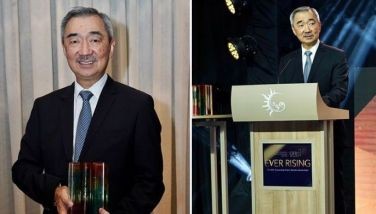No room for error

President Marcos would most probably have been informed by now about the contents of a letter addressed to him asking for the recall of two of his recent appointees to the energy sector.
Consumer advocacy group National Association of Electricity Consumers for Reforms (Nasecore) is asking the President to take back his appointment of Raphael Lotilla and Monalisa Dimalanta as secretary of the Department of Energy (DOE) and chairperson of the Energy Regulatory Commission (ERC), respectively.
In particular, Nasecore, through its president Pete Ilagan, said the recall of these two key appointments and their replacement with people not affiliated with any company in the power sector will help build and strengthen the foundation of the Marcos administration and win the trust of the stakeholders in the power industry.
But at the same time, the group acknowledged Marcos’ recent economic policy pronouncements including his commitment to addressing the high cost of electricity and to amend the EPIRA law which aims to protect electricity consumers by ensuring the quality as well as a stable, secure, and affordable supply of electricity through the establishment of a level playing field and the introduction of competition in the open market.
Both appointees come from the energy arm of the Aboitiz Group of Companies. Lotilla was a former independent director of Aboitiz Power Corp., while Dimalanta was chief legal counsel and compliance officer of the same company.
But now, Nasecore pointed out that they will be seated at the opposite ends of the governance process, Dimalanta being on the regulatory side as ERC chair and Lotilla on the implementation of government policies as energy secretary.
The group said that this is the first time since the passage of the EPIRA that these posts, which will have the power to recommend the review and revocation of utility franchise under the EPIRA, will be occupied by persons who come from power companies.
It stressed that this will not create an environment that will encourage prospective investors in the Philippine power industry since they will have reason to believe that there is no level playing field given the Aboitiz’ natural distinct advantage over all its competitors.
The Aboitiz Group, Nasecore emphasized, owns and controls both generation plants and distribution utilities so that their footprints are all over the energy industry which will be very hard to ignore.
Ilagan in his letter also noted that the needed and required objectivity of both appointees will always be put to question as decisions on critical and sensitive power issues need to be resolved through the issuance of a department policy or the ERC’s decision or order.
The President may not want to be at the receiving end of such potential backlash in the future.
But of course, and as always, it’s still the President’s call.
Tough balancing act
In 2019, the Department of Trade and Industry imposed a definitive safeguard duty on imported cement from various countries for three years to provide temporary relief to the domestic cement industry while it undertakes measures to boost the sector’s competitiveness amid trade liberalization.
And then, in December 2021, the DTI imposed an additional anti-dumping duty on cement imports from Vietnam for similar reasons.
With these duties ending next month, the Cement Manufacturers Association of the Philippines (Cemap) wants to extend the imposition of tariffs given that the entry of cheap and often dumped imported cement continues despite the higher temporary safeguard and dumping duties.
Cemap has warned that the continued dumping of cement from other countries threatens not only their businesses but also their workers and other industries that depend on this vital construction material and even the government which stands to lose all these revenues coming from the local cement industry.
But there are consumer groups that believe otherwise.
Laban Konsumer, led by Vic Dimagiba, believes that imposing tariff measures, both safeguard duties and anti-dumping duties, are to the prejudice of Filipino consumers and national interest especially in a time of high inflation and financial instability, not to mention that it puts at risk the government’s ambitious infrastructure program in terms of higher costs and tighter supply.
Dimagiba insists that trade liberalization and increased market competition benefit the consumers since businesses have greater incentives to lower prices, improve products and services, enhance productivity, and be more responsive to the market.
He said that the cement industry is not an infant industry and has received numerous benefits and support from the government for many decades, yet, cement companies have failed to demonstrate their capability to grow into maturity and competitiveness.
Dimagiba also noted that as early as 2019, they have already warned that the imposition of safeguard measures will only increase cement prices and ultimately hurt consumers. He cited reports from the DTI’s own price monitoring which showed that the retail prices of cement increased by P15 to P40 per bag in a span of three months, higher than the provisional safeguard duty of P8.40 per bag imposed at that time.
In early 2022, prices increased by as much as P20 per bag, again much higher than the P8 safeguard duty. Provisional anti-dumping duties imposed from December 2021 to April 2022 were estimated to have added anywhere between P2 and P25 to the cost of each bag.
These consumers groups are now saying that the steps the government has taken for the benefit of local cement manufacturers have been detrimental to consumers who must now pay more because of this protectionist policy.
If this is true, then there might be other ways by which government can protect the local cement industry, in particular the billions of pesos that some of the players are investing, but at the same give the consumers access to more affordable construction materials.
Finding a balance between the interest of business and industry on one hand and the consumers on the other is always a tough, if not an impossible, task. Someone’s got to give, but in this case, who should?
For comments, e-mail at [email protected]
- Latest
- Trending




























